

Internet Censorship. But internet censorship is hardly a dead issue; freedom of speech online continues to be threatened, and the ACLU is working against those threats: The Supreme Court's decision not to review COPA for a third time affirmed our stand – the government has no right to censor protected speech on the Internet, and it cannot reduce adults to hearing and seeing only speech that the government considers suitable for children.
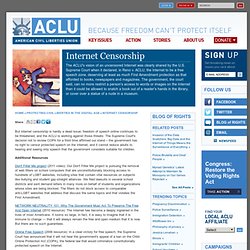
Additional Resources Don't Filter Me project (2011 video): Our Don't Filter Me project is pursuing the removal of web filters on school computers that are unconstitutionally blocking access to hundreds of LGBT websites, including sites that contain vital resources on subjects like bullying and student gay-straight alliances. We filed lawsuits in several school districts and sent demand letters in many more on behalf of students and organizations whose sites are being blocked.
Strategy for Countering Jihadist Websites (2010 PDF) Most Popular ACLU et al. v Alberto R. Is WikiLeaks Release Brave Or Unethical? Copyright © 2010 NPR.
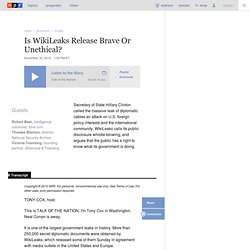
For personal, noncommercial use only. See Terms of Use. For other uses, prior permission required. TONY COX, host: This is TALK OF THE NATION. It is one of the largest government leaks in history. Secretary of State Hillary Clinton called it an attack on U.S. foreign policy interests and the international community. The public's response has been mixed, quite honestly.
Today, part two of our conversation about those leaks, and we examine their ethical and legal consequences. Our question to you: Was publishing them right, or was it wrong? We begin with our first guest, Robert Baer. Mr. Right to be forgotten no justification for internet censorship, Google warns. World's most popular search engine defends decision not to remove links to personal information despite privacy concerns Making search engines responsible for removing links to information held on publishers’ websites would breach the principle of freedom of expression, Google has told EU judges.
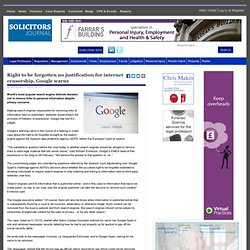
Google’s warning came in the course of a hearing in a test case about the right to be forgotten brought by the search engine against the Spanish data protection agency, AEPD, before the European Court of Justice. “The substantive question before the court today is whether search engines should be obliged to remove links to valid legal material that still exists online,” said William Echikson, Google’s EMEA head of free expression in his blog on 26 February. “We believe the answer to that question is ‘no’.” “Search engines point to information that is published online - and in this case to information that had to be made public, by law. Human Rights and Business Dilemmas Forum - Dilemmas. This page presents an introduction to and analysis of the dilemma.
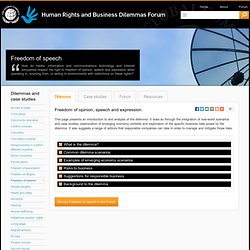
It does so through the integration of real-world scenarios and case studies, examination of emerging economy contexts and exploration of the specific business risks posed by the dilemma. It also suggests a range of actions that responsible companies can take in order to manage and mitigate those risks. "How do media, information and communications technology and Internet companies respect the right to freedom of opinion, speech and expression when operating in, sourcing from, or selling to environments with restrictions on these rights? " In recent years, companies - particularly those operating in the Internet, media and information and communications technology (ICT) sectors - are increasingly turning to high-growth emerging markets such as China in order to increase their competitiveness and market share. Freedom of speech and expression is not absolute. Real-world examples Yahoo!
Yahoo! Tweets of rage: does free speech on the internet actually exist? Is Twitter more like a phone company or more like a newspaper?
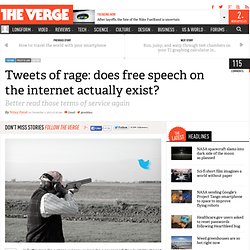
It's a laughably strained comparison — Twitter is Twitter, not some relic of a previous era — but the answer is central to understanding the pressures on large internet service providers to regulate what their users say. Free Speech is Only As Strong As the Weakest Link. Online speech must travel through several "upstream" providers before reaching its audience.
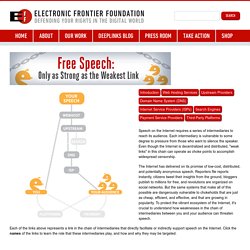
Each of these links in the chain may itself rely on its own upstream providers -- for example, smaller ISPs may simply connect users to larger ISPs, or hosting platforms may host their services on servers leased from a commercial datacenter. When at first they don’t succeed, censors try again upstream. The Internet’s strength lies partially in the fact that no single entity provides all the services necessary for the network to operate. The downside of this decentralization is that there are multiple intermediary points between any two users at which a third party may attempt to cut off speech.
If the party seeking censorship meets resistance at any given link, they may simply move further up the chain and try again. The further away from the user a service provider is located on the chain, the less incentive that provider has to push back against censorship of the user’s speech. Is Speech Too Free in Cyberspace?” Facebook Wrestles With Free Speech and Civility. Online censorship: Monitoring the monitors.